KVK Success Stories
Mushroom cultivation- A Profitable Venture
Oyster mushroom is a highly nutritional and a profitable crop that can be grown in a wide range of temperature. It is mainly grown on paddy straw under indoor condition which grows well in the temperature range between 18 -30 ⁰C and relative humidity of 80 – 85 %. The climatic condition of Assam, especially Barak Valley region is highly suitable for oyster mushroom cultivation and availability of straw in the valley offer good prospects for its cultivation
Keeping the above facts in mind KVK Hailakndi is trying to popularize mushroom cultivation in the district for better income generation and upliftment of livelihood. During the year 2013-14, KVK Hailakndi has distributed spawn of oyster mushroom (Pleaurotus sajor-caju) to twenty (20) beneficiaries out of which four (04) demonstration units were established by KVK Hailakandi to demonstrate the mushroom cultivation. Mr. Dhani Babu Singh from Chengbill, Lala was one of the beneficiaries of mushroom demonstration unit. He started his cultivation in the month of December 2013 with sixty (60) bags (1 bag = 1 kg dry straw) in his demonstration unit. He harvested a total of 34. 20 kg of fresh mushroom at the expenditure of Rs. 900.00 (@ Rs. 15.00/ bag). He sold it among the neighbours as well as in the local market @ Rs. 150.00/ kg and earned a total amount of Rs. 5130.00. The net profit resulted in Rs. 4230.00 in three months. “I am very happy and highly motivated with the performance of mushroom cultivation and planning to adopt this profitable venture commercially and want to increase the mushroom bag capacity of the unit in the future” – reacted Mr. Singh, the farmer. Observing his success, rural youths and other farmers from his village has expressed their interest to start mushroom farming as a source of income generation and self employment and consulted KVK for the technological backup and further help.
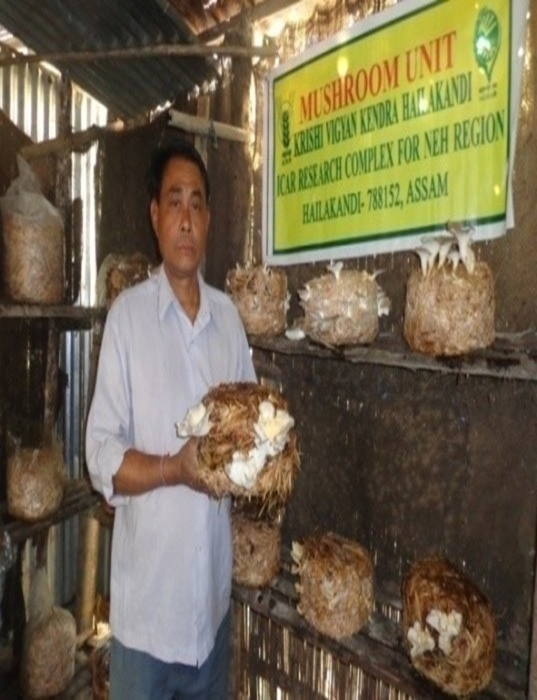
Food processing- An enterprising enterprise to a farmer
Mr. T. Chawiliana, a young and very poor farmer of Garod Punji Village, Katlicherra Block of Hailkandi district wanted to overcome his distressed state by utilizing the local crops of his village for value addition. The village, Garod Punji is in the bordering area of Mizoram and is hilly. Most of the people of the village are involved in cultivating pineapple in their traditional method. Mr. Chawiliana also had a pineapple farm intercropped with areca nut, jack fruit, banana and black pepper. He use to sell his farm produce in lease system at a very cheap rate and hardly earns profit out of it after all the expenditure that he makes for its cultivation. It was then he came in contact with KVK and its activities, where he discovered the unexplored possibilities of value addition of fruits and vegetables. After knowing about KVK, he motivated his village people also in utilizing their locally available fruits for value addition and earning more benefit from it. Mr. T. Chawiliana along with eleven other members from his village formed a group and took several training programmes on value addition and packaging. His group was then selected for special vocational training programme under Tribal Sub Plan (TSP) and also been supported with all the inputs for micro processing unit under TSP. Later on he named his processing unit as Garod Punji Food Processing Unit and he is working actively as president of the same with eleven other members. Raw materials for the effective functioning of the unit are arranged mostly from their own farm only. He carries out primary processing and then preserves and stores the fruit pulp, vegetables/fruits in brine/syrup, or dehydrates them so that it is used for value addition during off season. He mainly produces products like pineapple RTS, pineapple squash, pineapple jam, pineapple chutney, jack fruit pickle and jackfruit jelly and sell in his local areas only. His products have great market demand in his locality. He has also studied the marketing potential of his product in the nearby state Mizoram and observed that he has a great scope there too. Now, he is also planning to include meat and fish products as well.
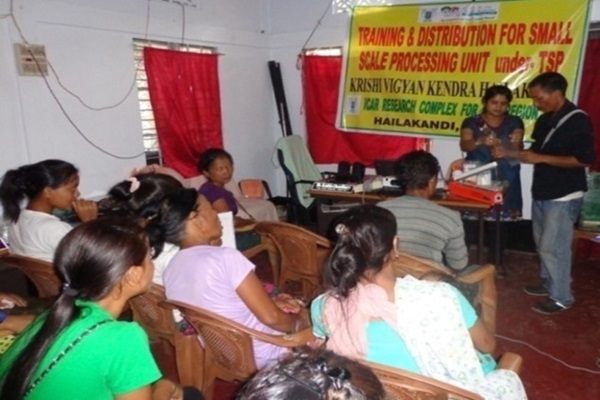
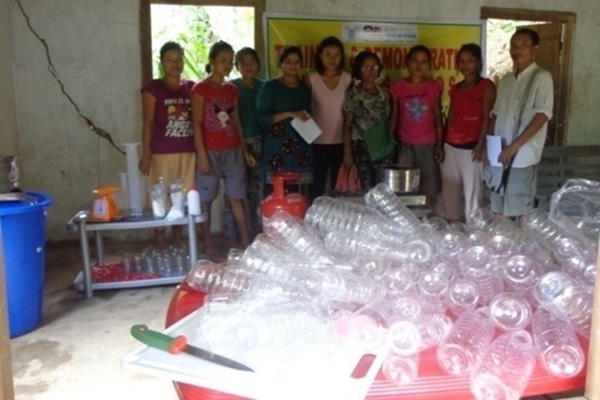
Mr. T. Chawiliana in his own words “KVK has given me the strength to empower myself and my poor village people by introducing the enterprise of value addition. I am very happy with the performance of my processing unit.” Mr. T. Chawiliana believes that his regular contacts with KVK have helped him to recoup his potentials and to strengthen his commitment towards the society.
Mr. T. Chawiliana has a production strategy based on seasonality chart for crops developed by KVK for the local fruits. This enables him to organise and store raw materials round the year. He and his group are well utilizing the unit and earning an average of Rs. 5100/ month. As a beginner, his group makes a net income of Rs. 58000/ year solely from processing. He is now running his farm in parallel with his processing unit.
More Success Stories
Backyard Poultry
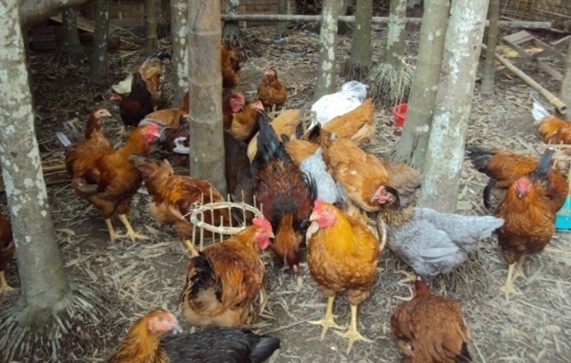
For introduction and demonstration of improved germplasm of backyard poultry in the district, Vanaraja for meat and egg (dual purpose) and Gramapriya for egg purpose were provided to selected families from different village. The technology was demonstrated through OFT mode. They were given 15 numbers of 3 weeks old birds of Vanaraja and Gramapriya for backyard poultry to up-grade the local flock of poultry.Read More
Winter Fodder Oat Cultivation
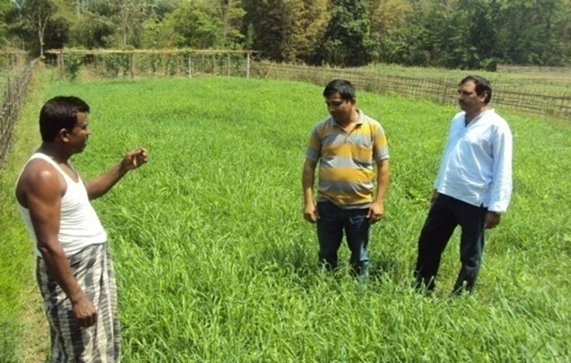
KVK Hailakandi in its endeavour to improve the availability of green fodder especially during winter season as there is scarcity of greens for feeding to animals in winter has encouraged the green fodder production in winter season by providing quality seed on OFT mode.The quality and performance of Oat as fodder was realized by the farmer.KVK monitored the farm regularly and provided suggestions and recommendation through regular visits.Read More
Overcoming bacterial wilt in brinjal
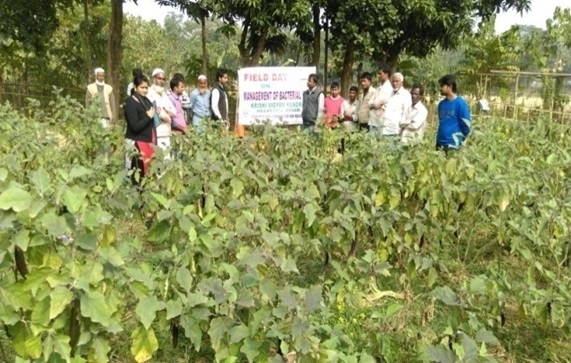
Krishi Vigyan Kendra (KVK) Hailakandi has taken initiative to popularize and showcase the management technology of wilt disease in brinjal by using Biofor Pf -2 (an organic biopesticides developed by Assam Agricultural University, Jorhat, Assam that contains beneficialmicrobes Pseudomonas fluorescenceand (Trichodermaharzianum) which increases soil nutrients, rejuvenate soil, enhances plant growth and combat soil borne diseases. Read More
Solar Polythene Tent Dryer
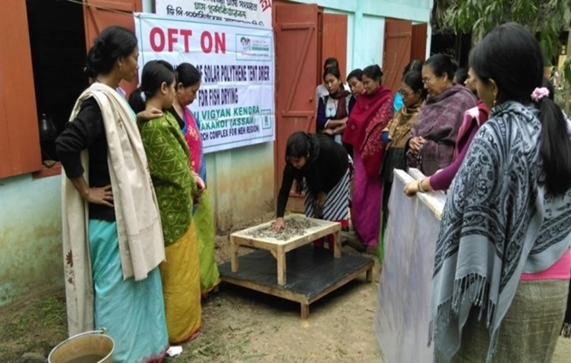
A technology for fish drying i.e. Solar Polythene Tent Drier was introduced through On Farm Trial (OFT) for fish drying which reduces the time of drying as well as increases the shelf life of the produce. The fish dried through this technology was more acceptable sensorily. The technology was highly acceptable by the farmers and farm women of the district. Read More
Sushma-A balanced diet for carp
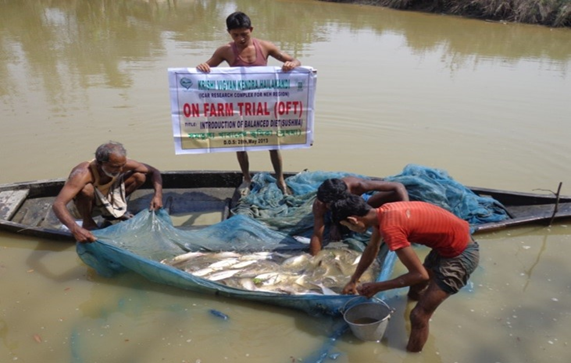
Sushma a balanced diet formulated and manufactured by Fisheries Research Centre, AAU, Jorhat. It is prepared by without using fish meal in its composition. The fish meal is replace using edible soya bean flakes as protein supplement. In order to demonstrate the importance and the role that balance feed has in increasing the fish production, KVK Hailakandi started taking OFT on Introduction of Balanced diet (Sushma) for carp.Read More
Maize Cultivation in fallow tillah
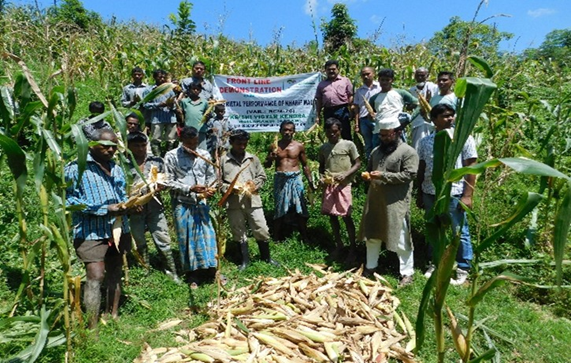
Demonstration on maize was carried out in kharif season from 2013 to 2016 in Hailakandi district of Assam.The performance of the technology demonstrated on utilization of fallow tillah land by cultivating maize in kharif season was good the farmers were very impressed by seeing the economic output comparison between the cost of cultivation we calculated was Rs. 28,500/- with a gross return of Rs. 43,270/-. Read More
WOMEN EMPOWERMENT THROUGH FOOD PROCESSING
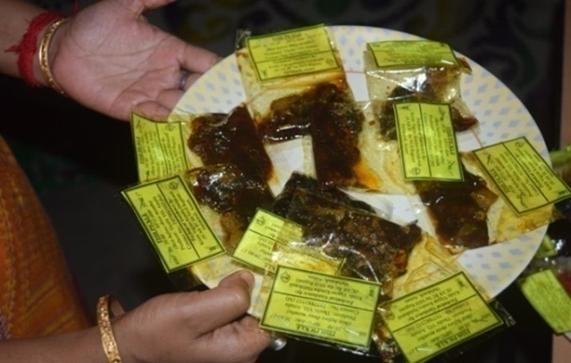
Mrs. Uma Rani Singha, President, Thoibi V.O and Mrs. Brajarani Singha, Secretary, Thoibi V.O, of village Purbakittarbond PII, in their own words “KVK has given us the strength to empower our self and our poor village people by introducing the enterprise of value addition. We are very happy with the performance of our processing unit.” The V.O believes that their regular contacts with KVK have helped him to recoup their potentials and to strengthen their commitment towards the society. Read More
Household Food and Nutrition Security by Nutrition Gardening
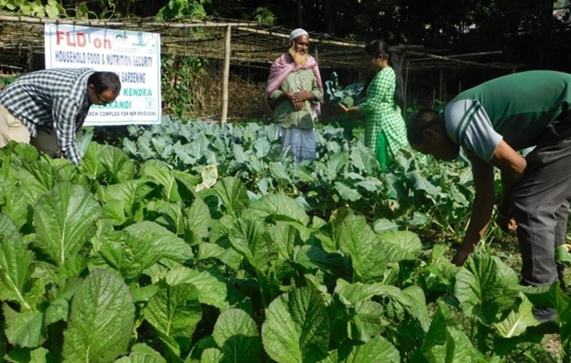
The percentage increase in energy intake was found to be 26.9 in children (4- 9 years), 14 % in early adolescent (10 – 14 years), 16.7 % in adolescent (14 – 19 years) and 26.2 % in above 19 years. This can be attributed to improved diet knowledge due awareness about health and nutrition and increase in nutrient intake due to easy availability and direct access to vegetables and fruits after establishment of nutrition garden. Read More
